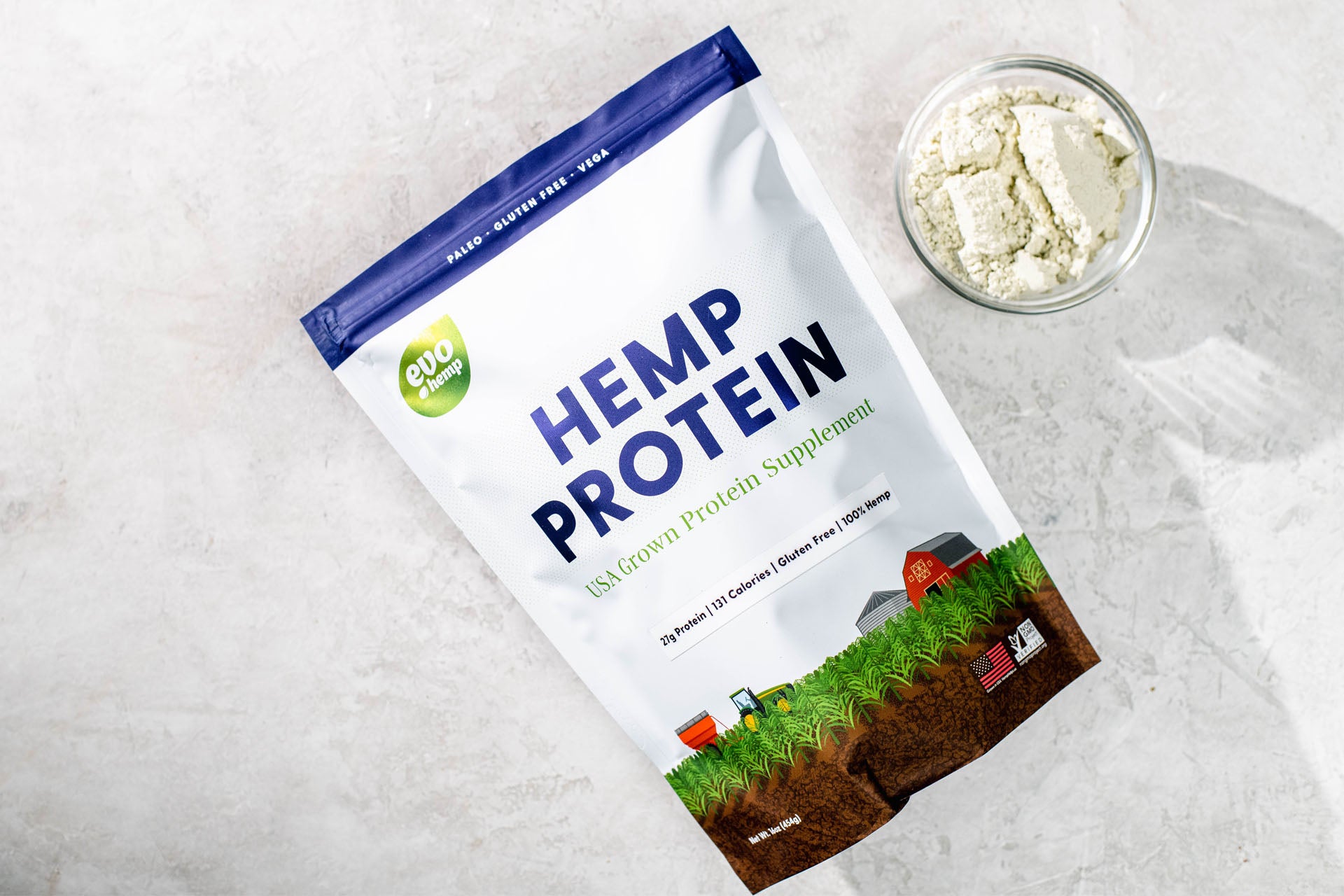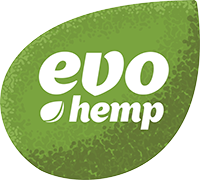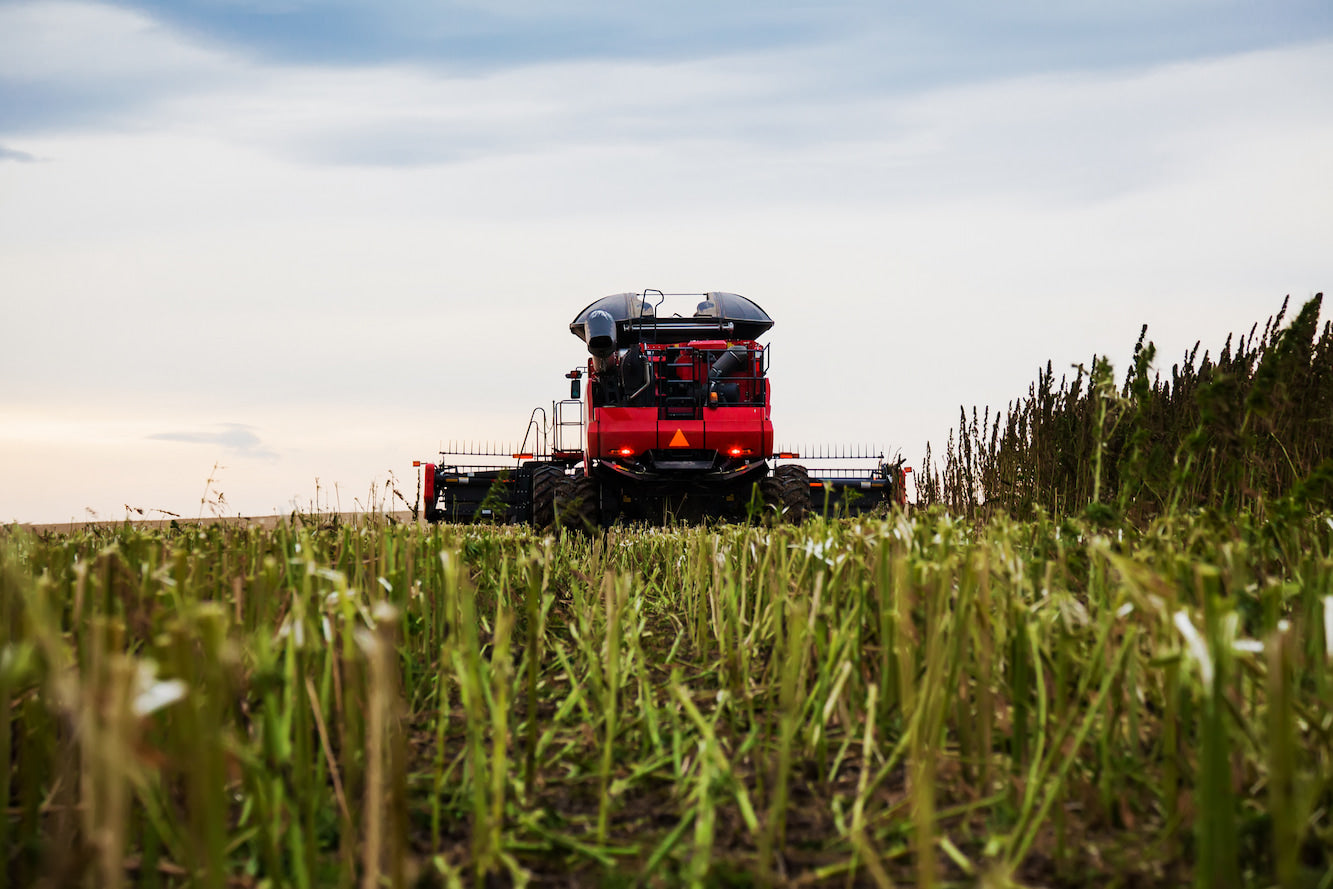Hemp Protein Powder: A Complete Guide

Protein powder is becoming increasingly popular. Whether incorporated into your exercise routine to help refuel the body post-workout or used to increase your protein intake in a low-meat diet, protein powder can be a convenient and filling source of nutrients.
But with so many protein powders out there, it can be challenging to know where to start.
Let’s discuss one of our personal favorites: hemp protein powder. So, what exactly is hemp protein, and how does it compare to other options on the market? Let’s dive in!
What Is Hemp?
Stemming from the cannabis sativa plant, hemp has over 25,000 uses ranging from medicinal to textile. Thanks to its fiber-filled stalks and nutrient-packed seeds, the hemp plant is considered a superfood as it contains vitamins, minerals, protein, and healthy fats.
Why Is Protein Important?
Protein is a macronutrient, meaning it is a vital energy source that the human body needs to continue essential functions. Along with protein, the other main macronutrients include carbohydrates and fats.
Protein is necessary to help grow and maintain muscle mass, repair damaged muscle tissue, support the immune system, and produce enzymes needed within the body — all of which require amino acids.
What Do Amino Acids Do?
Amino acids are the compounds that make up protein. When we eat protein, it is broken down into amino acids that are then used for various functions of the body, including immune support, the building of proteins and muscle, and the synthesis of hormones and neurotransmitters that regulate mood.
Our bodies require 20 different types of amino acids to maintain normal function. However, there are nine amino acids that the human body cannot produce on its own, meaning that we can only access them through the nutrients we consume. These nine amino acids are therefore considered essential.
While all meat products contain all nine essential amino acids, only some forms of plant-based protein do. This means that those of us who only eat little or no meat need to be sure we are getting enough protein, and the right types of protein.
Who Is Hemp Protein Made for?
While bodybuilders and weight-trainers most notably use protein powder, hemp protein can be for anyone.
Hemp protein can help support a variety of functions, such as:
- Replacing the energy lost after an intense workout
- Supporting muscle recovery and growth when used before or after an exercise routine
- Supplementing a low-protein diet
Not to mention, hemp protein can help those who are vegetarians, lactose intolerant, or sensitive to soy ensure that they are getting enough protein, and it can simply make for a nourishing snack when incorporated into a smoothie or baked good!
What Are the Benefits of Hemp Protein?
As a complete protein source, hemp protein contains 20 amino acids, including the nine essential amino acids. Other benefits of hemp protein are below!
Easily Digestible
Hemp protein is a highly digestible source of protein. In fact, hemp protein contains more protein than grains, legumes, or nuts, making it an excellent option for those with sensitive stomachs.
Typically, animal-based proteins are easier than plant-based proteins, but hemp protein may be the exception. Between 91–98% of hemp protein is digestible. This is likely due to its high content in edestin and albumin, which are quickly broken down by the body.
It is also worth noting that heat processing can make hemp protein around 10% less digestible, so look for powders that use cold-pressed hemp seeds (like all of ours!)
Sustainable and Environmentally Friendly
Hemp is considered one of the most sustainable plants ever grown. It requires extremely little water to produce, absorbs toxins from the atmosphere, and introduces nutrients back into the soil. Hemp is also biodegradable.
Little-to-No Processing Required
From growing the hemp plant to converting it into protein powder, minimal processing is required. Hemp does not need chemicals, pesticides, or fertilizers to grow, setting it apart from the majority of other forms of protein powder.
At evo, our hemp protein powder is a clean source of protein, with no other ingredients beyond our ethically and sustainably sourced hemp.
Nutrient-Rich
Along with all 20 amino acids, the hemp seed also houses iron, vitamin B, E, potassium manganese, magnesium, and zinc.
Hemp protein powder is a mighty source of fiber, which helps maintain healthy blood sugar levels.
Hemp seeds also have the perfect three-to-one ratio of omega-3 and omega-6 fatty acids, which is the ideal ratio to support a healthy immune system, brain function, assist in heart health and metabolism, prevent bone loss, reduce swelling, and lower cholesterol levels.
Antioxidant-Rich
Hemp seeds are also rich in antioxidants due to their high content of lignanamide compounds.
Antioxidants can help reduce oxidative stress that may contribute to heart issues and skin damage over time, bringing added benefits to your wellbeing.
Great Tasting
With a subtle nutty and earthy flavor, hemp protein can be mixed with any non-dairy beverage, added to a smoothie, or baked into your favorite treat.
How Does Hemp Hold Up Against Other Protein Powders?
Hemp joins a shortlist of vegan proteins containing all 20 amino acids, along with buckwheat, soybeans, amaranth, chia seeds, sprouted lentils, spirulina, and quinoa.
Other plant proteins such as soy, pea, and rice protein are highly processed and contain less fiber. Not to mention, whey protein is animal-based, and also must be heavily processed.
Whey protein contains larger amounts of each amino acid per gram than hemp protein, although hemp’s amino acid content is similar to an egg white. However, hemp protein has a higher proportion of amino acids compared to soy protein.
While hemp protein is low in lysine and leucine amino acids — which help support protein synthesis, muscle repair, calcium absorption, and immune function — hemp does contain an exceptionally high amount of tyrosine and arginine.
Tyrosine plays an essential role in creating neurotransmitters such as epinephrine, norepinephrine, and dopamine. Meanwhile, arginine supports heart health by calming blood vessels and reducing blood pressure, and potentially reducing the risk of heart health complications.
How Is Hemp Protein Powder Made?
With no refinement or chemical processing needed, hemp protein is made sustainably.
First, farmers harvest and clean the seeds. The seeds are stored and then washed again before the hulls — also known as the shells — are removed.
The shells are then cracked open, and the hemp hearts are removed from within them. Both the shells and the hearts are edible, but it is easier to eat the hearts on their own.
The hemp seeds are cold-pressed to remove the oil, while the solid parts of the seed are grounded into powder form. With the oils extracted, the remaining protein powder is lower in fat content than the hemp seeds.
And that is it! No chemicals, no refinement -- just pure and nutritious hemp hearts.
Is Hemp Protein Powder Safe?
Protein powders are considered safe, although you should typically remain within your recommended daily protein intake, which can vary based on age, body weight, and fitness level.
The few potential side effects of protein powder are often minor and short-lasting, including nausea, drowsiness, headaches, dry mouth, or reduced blood pressure.
It is important to note that hemp protein can react with certain medicines, such as blood thinners, so make sure to check in with your doctor if you are thinking of incorporating hemp protein into your daily diet.
How Much Protein Do I Need?
If you are engaging in regular weight training, a recommended daily amount of protein is typically between 0.72 to 0.90 grams per pound of body weight to support muscle growth. However, if you are not partaking in intense weight lifting activities, you will likely need less protein.
Most hemp protein powders contain about seven to eight grams of protein per ¼ cup, providing 18-28% of the recommended daily protein intake for adults.
While the typical hemp protein powder has around 1.5 grams per 30-gram serving, our hemp protein provides an even more concentrated option, with 27 grams of protein in every 30-gram serving.
However, it is always best to consult your doctor for the most accurate amount and personalized dietary recommendations.
Hemp Protein and CBD Protein: What’s the Difference?
While CBD does come from the hemp plant, hemp protein powder and CBD protein powder are not the same.
CBD is a cannabinoid found in the flowers and leaves of the hemp plant, but not the seeds used to make hemp protein powder. While hemp seeds are filled with proteins, CBD does not contain any protein on its own.
Instead, CBD is added to an already-existing form of protein powder.
Because CBD can work with the body’s endocannabinoid system to help soothe sore muscles, ease tension, and support muscle repair, CBD can be added to protein powder to help support exercise-related muscle recovery.
It is also good to know that hemp products, including protein powder, do not provide the psychoactive effects associated with the THC cannabinoid.
Conclusion
At evo hemp, we take pride in providing quality hemp-based products. Whether you are looking for ways to support muscle growth, build your immune system, improve post-workout recovery, or simply eat cleaner while still consuming a healthy amount of protein, hemp protein powder can help do the trick.
Sources:




